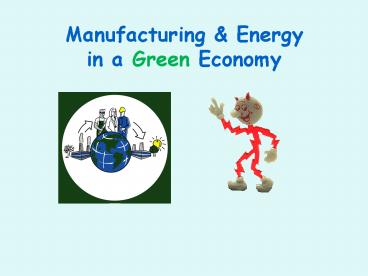Manufacturing PowerPoint PPT Presentation
Title: Manufacturing
1
Manufacturing Energy in a Green Economy
2
The Crisis of Markets
The Swing to Regulation
3
Issues
- Automation of blue-collar work.
- Degradation outsourcing of blue-collar work
globalization. - Undervaluing of Resources labour- vs.
resource-productivity - Automation of white-collar work
- De-marketization of production the Commons.
- A crisis of jobs or a Crisis of Remuneration?
- Is Fordist-era manufacturing the solution?
4
Key Theme Redefining WealthPhantom/Casino vs.
Real Economy
- Quantitative
- Money Material
- Accumulation
- Qualitative
- Well-being
- Regeneration
5
Is Wealth Reflected in...
- income and stuff?
- or
- meeting (developmental) human need?
6
End-Use the Green Economy
- The Service Economy
- Hot Showers and Cold Beer
- Nutrition, Illumination, Entertainment, Access,
Shelter, Community, etc. - 2. The Lake Economy
- Economic Biomimicry, flowing with nature, Every
output an input, Closed-loop organization, Let
nature do the work
7
The Soft Energy Path
- A flexible diverse mix of energy supply
- Primacy of Renewable energy sources
- Focus on End-use, on Conservation, and on
efficiency of use - Energy matched to the task at hand in both
QUALITY and SCALE - Participation-oriented structure--in both
production and consumption - People-intensive development and Job-creation
8
Historical Trends in Energy Development from
Quantity to Quality
- Dematerialization
- Decarbonization wood to coal to liquid fuel to
natural gas to renewables negawatts - Decentralization
- distributed generation
- solar photovoltaics, wind turbines, small hydro,
etc. - fuel cells, flywheel batteries, etc.
9
Dematerialization the ESCO model
- Savings as a virtual source of energy
- The Green Economy creates Wealth through savings
(or dematerialization) - Savings as a source of Investment
- Challenge of financial design dealing
with first costs
10
Energy Spatial Organization
- Energy the Landscape
- Eco-infrastructure going with nature
- The Eco-system Model eco-infill
- Integrating the Divided Economy
- Every place a locus of eco-production
- Buildings as producers not just
- consumers of energy
11
The Centrality of the Landscape
- The industrial age replaced the natural
processes of the landscape with the global
machinewhile regenerative design seeks now to
replace the machine with landscape. - John
Tillman Lyle
12
The Ecological Built-Environment
- Qualitative Development is Place-based
- Eco-efficiency tied to spatial design
- Need to Integrate structures of Invisibility
- home workplace
- formal vernacular landscapes
13
The Post WW II Waste Economy
- Permanent War Economy
- The Suburb Economy
- Oil / Autos / Subdivisions
14
The greatest misallocation of resources in human
history. James Howard Kunstler
15
The Labour/Resources (People/Nature) Balance
- Green Economy substitutes human creativity for
resources energy - Human development should be the primary strategy
for sustainability - Eco-production high eyes to acres ratio.
Efficiency depends on participation.
16
3-Ds of Green Development
- Dematerialization
- Detoxification
- Decentralization
17
Basic Question
- If the green economy requires dematerialization,
how does that affect manufacturing? - industrialism and production-for-productions-sake
- new role of manufacturing in servicing human
need.
18
Human Development in the Green Economy
- Production human creativity the key
- Consumption end-use
- Direct targeting of human need
- massive resource savings
- Regulation participation at all levels.
19
People/ Work / Human Capital
- importance of Creativity in postindustrial
economics. - knowledge-based production
- displacing resources from production
circulation. - education training continual learning,
learning doing, self-actualization, community
development.
20
Financial Property Design
- Internalizing the externalized
- monetary system
- Ownership stewardship responsibility
liability design - EPR, Service Economy
- Ecological Tax Reform / tax shifting
- Intellectual property
21
Another Central Question
- do we have a crisis of insufficient work, or
insufficient paid work? - maybe the issue is of how to properly remunerate
necessary work.
22
Remuneration Qualitative Wealth
- Sever work and income?
- Wages tied to certain kinds of production
markets. Public goods not so well served by
markets. - Economic insecurity closely related to
environmental destruction. - basic incomes? community currencies?
23
Design Considerations in Production
- Craft money and the economy of labour time in a
Quality-oriented economy - Production and Eco-infrastructure
- the production of food, energy and water via
natural process
24
Manufacturing the Ecological Service Economy
- Subordination to Mission / end-use / need /
quality - Waste Equals Food
- Dematerialization of Production and Higher
Resource Efficiency - Reduction of the Speed of Resource Flow through
the Economy - Appropriate Scale
- Regenerative Work is Created
- New Rules Closed Loops LCA and EPR
25
The Economy in Loops
26
Industrial Ecology Service
- Ecosystem model nature-imitating
- Industrial ecostructure Reuse-based
Manufacturing - entails new levels of producer liability
- reduces both the flow of resources and their
speed through the economy - encourages local/regional economies, and
- facilitates high skill levels
27
Cradle-to-Cradle Design of Material Flows
28
Benign Materials the Carbohydrate Economy
- plant matter as the original source of synthetics
plastics - biological revolution genetic engineering make
possible cheaper more prolific creation of
enzymes. - biochemicals less toxic degrade more quickly
than petrochemicals. - detergents, paints, dyes, inks, adhesives,
fabrics, building materials, etc. - zero discharge and industrial clusters
- complete use of plant materials
- plantations, biorefineries and green cities

